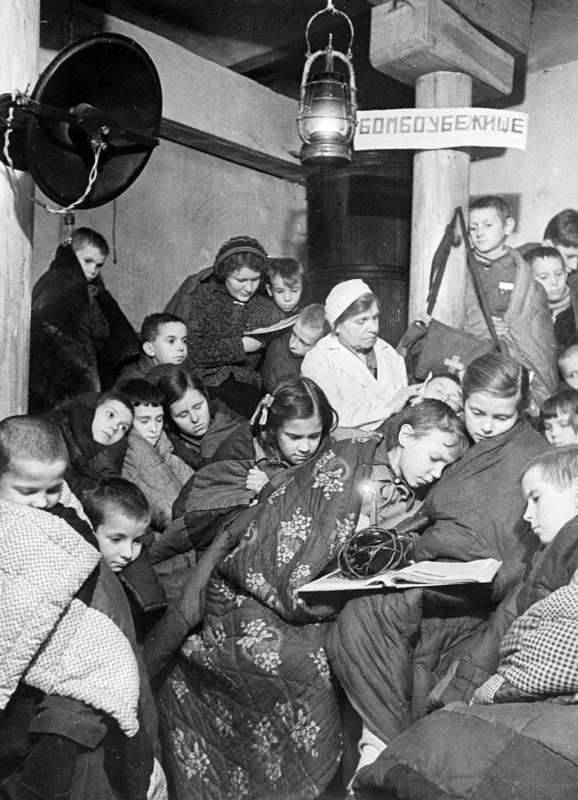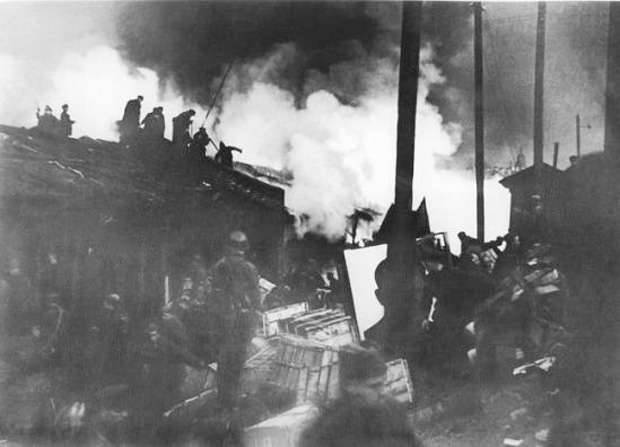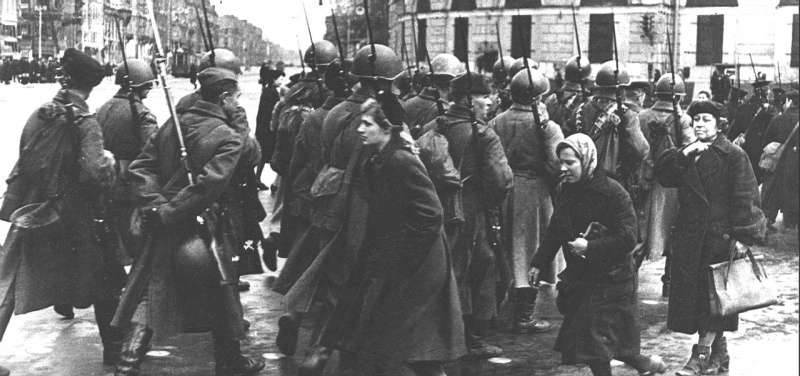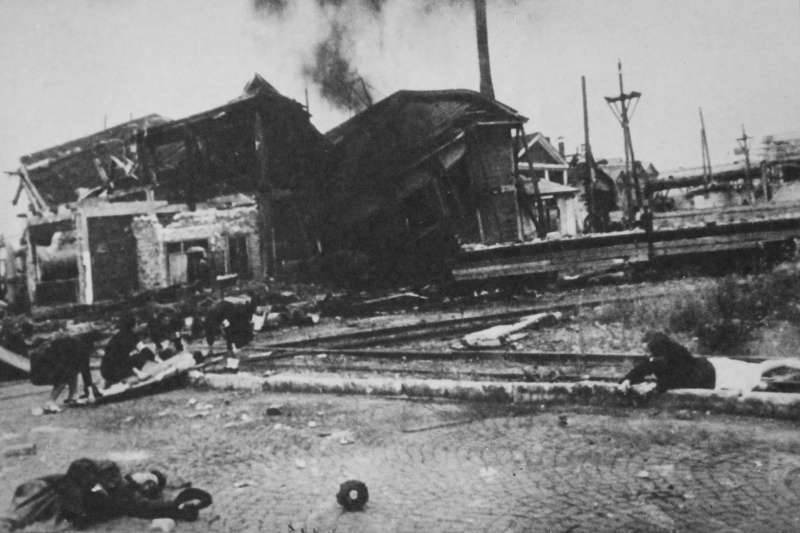The voice of the German announcer: "They are not worthy to be called people." Part of 1

Leningrad blockade broke through 18 January 1943 of the year, but the final lifting of the blockade occurred a year later, 27 January 1944 of the year.
Two months later, Hitler's troops were at the walls of Leningrad and were absolutely certain that they would manage to take the city by storm. It is difficult for us to believe that in Hitler Germany, someone could contradict or even express the opposite opinion. But that was the case with the question of Leningrad. A whole group of German generals (some of them went through the First World War) believed that storming Leningrad, the fortified largest center, could not be taken. This is disastrous for the army. And Hitler, on the contrary, hysterically, fanatically demanded an assault. According to an excerpt from the High Command combat magazine, in the summer of 21 on June 1941, Hitler visits the group of the army “North” and, speaking to the officers, in particular, says: “Leningrad is extremely important. Compared to the value of Leningrad, Moscow is just a geographical object on the map. ”
From the telegram of Stalin to Leningrad 29 August 1941 of the year: “They just said that Tosno was taken by the enemy. If it continues like this, then I am afraid Leningrad will be surrendered foolishly stupid. ”
This is how it happened. On September 8, a group of the German army “North” goes to Lake Ladoga from the south, and Finns have already approached the city from the north. And the city was in the ring. September 8, the first major aviation plaque. Shooting from the cockpit of a German bomber: the plane flies over the Leningrad port, it seemed that infinitely supplying bombs were visible. Fire in food warehouses named after Bolshevik Badayev.

In Soviet times, this fire will be called the main cause of the famine: supposedly all the city food burned here. In fact, in these warehouses of food was for a month.
At this time, students, retirees and schoolchildren, already in full view of the Germans, are digging anti-tank trenches and trenches at the nearest approaches to the city. Very often, German pilots dropped bombs, and sometimes at a low level flight shelling people. Sometimes they dropped leaflets that said, "Ladies, do not dig your dimples, our tanks will come, bury your dimples." And on the back is a pass, go to us, to our side, we have a good life, a new order. There was not a single use case for the direct purpose of these leaflets.

There is such a legend. I often heard her from the blockade. Say, Stalin is to blame for everything, he did not specifically prevent the blockade and the death of hundreds of thousands of people because he hated Leningrad. Firstly, here, before the revolution, Stalin was arrested by the Tsarist secret police, and secondly, there was Kirov, the main rival of the leader. Thirdly, this is the eternal Leningrad intelligentsia with its anti-Soviet sentiments. And, fourthly, Leningrad "delayed" a large number of German troops from Moscow. But this is just a legend. In fact, the Generalissimo really wanted to help Leningrad: in August 1941, when he noticed the precarious situation of the city, it was impossible to save him. And there was no strength. But the Russians were dead.
Convinced of this, the German generals persuaded Hitler to postpone the assault on the city. For the first time, Hitler admits that the enemy is stronger. He gives a forced order to transfer units to Moscow tanks and aircraft involved near Leningrad.
20 September 1941 of the year. The residents of Leningrad do not know that on this day the Germans decided not to storm the city. They decided to transfer the assault to the spring of 1942, confident that it would pass easily: in winter, the population and the army in the besieged city would simply die out.
The Bundesarchive keeps a secret directive from 29 September 1941: “Top Secret. Only for officers. After the defeat of Soviet Russia, there is no interest in the continued existence of this locality. It has been proposed: to closely block the city and by shooting from artillery of all calibers and continuously bombard it from the air. For our part, there is no interest in preserving at least a part of the population of this big city. ”
In August, Klim Voroshilov commanded the defense of the city. Marshal, the hero of the civil war, he was completely unprepared for such a turn of events. Three days after the blockade began, Stalin signed an order to remove Voroshilov and replace him with the young, determined Georgiy Zhukov. Zhukov arrives in the city, immediately from the airfield goes to Smolny, where the city leadership sits incessantly, and tells Voroshilov right from the door: "I have no time for formalities, hand over the cases."
A few days later Zhukov would give his order: “Any deviation along the line of Kolpino - Shushary is considered as treason against the Motherland. Punishment is shooting. ” Zhukov acts tough. But only this way he manages to restore order. However, he will not stay in the city for long. His talent is required near Moscow, where Hitler sent his main blow.
“Thank you to the people of Leningrad for helping the Muscovites fight the bloodthirsty Nazis,” Zhukov would send such a telegram when ammunition made at Leningrad factories would be delivered to the front.
German propaganda comes in malice. The voice of the German announcer says: “Let Roosevelt and Churchill look at these Asian faces, there is nothing human in them. This is the Bolshevik hordes. They must be exterminated, they are not worthy to be called people. This is who the allies of Russia are helping. ”
“We knew that it was hard for people in Leningrad,” said Wehrmacht non-commissioned officer Horst Voigt. “That they are starving right on the streets.” We were so close to Leningrad that I saw trams in the city. ”
Trams in the city run until December 1941. But in the afternoon of December 8, the electricity in the city was turned off, and the trams did not reach the depot, they were abandoned right on the streets.

Since then, 71 has passed a year.
Alas, living witnesses of that time are less and less every year. A meeting with a man who survived the blockade is able to unleash our souls, help us realize that the people of Leningrad have survived. In Rostov, there were only three eyewitnesses to the terrible pictures of the besieged city.
Yury Pavlovich Evstigneev told me about the difficult years of his childhood. 8 September 1941, the blockade ring tightly closed, Leningrad fell into an iron vice, from which, it seemed, could not get out. Citizens began to stock up on food, to act together to organize assistance to the soldiers - the defenders of the city. Yuri Pavlovich says that since the beginning of the war, he, a four-year-old boy, as if in one moment became an adult, still remembers the horrors of the blockade.
Little Yura lived with his mother Irina Grigorievna and elder sister Rosa, his father went to the front in the first days of the war. The mother and the children did not have time to evacuate from Leningrad, because systematic shelling began almost immediately and the escape routes were cut off. Like many, they remained to survive in spite of the enemy, so that they would never give up their hometown to the fascists. And the family of Yuri Pavlovich had a hard time. In the bakeries, where the daily ration was issued, there were huge queues. At home, mother cooked leather belts, stationery glue, whose sweetish taste to blockaders, probably, never forget. Yuri Pavlovich recalls that in the first winter the rations of bread became less and less every day.
Leningraders calmly talked about the bombing, about the devastation, about death. They cannot talk calmly about hunger.
The lower rate of bread distribution is 125 grams per day for non-working, set in January 1942 of the year.
The word "dystrophy" is becoming commonplace. For the first time open hospitals for dystrophics. The event for world medicine is unprecedented. Many people have dystrophy of the third degree. One of the main signs is a wandering, non-stop gaze. Inverted eyelids, bloody diarrhea. With the third degree of dystrophy, the person is already doomed, it is impossible to save him. After the war, the doctors who survived the blockade proposed the scientific term “nutritional dystrophy”, i.e. from lack of food. Dystrophy medicine offers easily digestible food that contains a lot of proteins, a lot of carbohydrates, and could not eat five times a day, but people couldn’t even dream of such a besieged Leningrad. Bread was the sweetest dream.
For her son and daughter, Irina Evstigneeva dissolved crumbs in hot water, this was all the food. Only aviation and the “Road of Life”, which passed through Lake Ladoga, saved Leningraders.
In addition to hunger, Leningrad suffered a natural disaster: very cold weather. Especially in the first, most hungry, winter: the thermometer sometimes went down to -40 degrees. Out of fuel, frozen water pipes, almost all houses were left without electricity and drinking water. Yuri Pavlovich remembers how his mother heated the stove-stove. It burned all the furniture that was in the apartment.
Women spared nothing to warm and feed their children. Over the water, the Evstigneevs went to the Neva, which was in 150 meters from their home, but this distance was more and more difficult to overcome. The river was very cold, and ice holes were made in it. Buckets, cans carried on a sled or carts. So there was no strength that often one person pushed, and another pulled. Sometimes starving people could not bring a teapot with water to the house; they had to rest several times. At first, all this caused fear, and then the picture became familiar: on the streets of the city one could see dead people falling. Unfortunately, death has not bypassed Yuri Pavlovich’s house. In the hungry and cold years of the blockade, she and her sister Rosa lost their mother. Many weakened women and children after a few months of siege could not move.
In the cold they put on everything that was, and they all went to bed together to warm each other with their warmth. So did the Evstigneevs. Irina Grigoryevna, to the last, tried to give her warmth to her little son and daughter, but her strength left her every day.
One morning, the children woke up and did not see the mother next to her, for some reason she lay on her feet all numb. My mother died of starvation, and in the last minutes of her life she warmed the little ones with the hope that they would definitely survive. Yuri Pavlovich says that for two or three days she and her sister screamed with grief, fear and despair.
They were saved from death by the patrol, the sailors and the house manager went around all the apartments and found the tortured, half-dead children.
The kids were identified in orphanages, where they stayed until the final blockade was lifted. From the first days of the siege of Leningrad every now and then was subjected to shelling. It was dangerous to walk on the streets and avenues, but the need forced it to do so.
People went to work, to draw water in the Neva, to buy bread cards. Yuri Pavlovich recalls that in some streets of the city there were inscriptions about danger, which are preserved in some places as a memory of the war years.
Yura and Rosa Evstigneev were destined to survive the blockade, most of them were in an orphanage. In 1944, they were found by their father, who was commissioned from the front because of a severe injury. Pavel Egorovich took the children home, where they began life anew, without war, hunger and death. Yuri after graduation left Leningrad for the south, where he and his friends wanted to find work. On the train, they met people from Donetsk, who were just starting to build. They were told that there are mines in the city where workers are required, and the guys decided to try themselves in the mining profession.
Young Evstigneev city and the work of the miner came to mind, he immediately decided to settle here. Six months later, he married a girl, Paradise, with whom they live together for 60 years, have two daughters and a grandson.
During these long years, Yury Pavlovich was many times in his native Leningrad, which he still calls home. The city on the Neva is his birthplace, where he grew up; he went with his parents to the stadium as a little boy. Then he had to endure the worst in his life: war, blockade, famine and death of his mother. I didn’t live there, because I don’t like hustle and bustle, and here I quickly became attached to the Donetsk steppes and mines.
He is proud that he worked as a miner, he would never trade for any other profession. Underground experience at Yuri Pavlovich solid, more than 40 years. He was always appreciated and respected as an employee and person. About modest rewards, he modestly silent, says that it does not matter all. Yu. P. Evstigneev and retired for a long time did not sit idle for a day, because he is a master of all trades. Now, unfortunately, vision is failing, and there would still be enough strength for many things. Yuri Pavlovich is a very kind and good person.
He loves animals. Until recently, he and his wife, Raisa Ivanovna, had several cats and dogs. But the old house was demolished, and only two cats moved to the new apartment. The owner of them very much cares and complains that others have fled, and now they can not be found.
Yuri Petrovich’s home has a lot of books that he reread several times. The works of the classics, in his opinion, bring up real people in us. Yuri Pavlovich also owns a collection of vinyl records, loves to listen to Vysotsky. Our generation Yuri Pavlovich advises to live life to the fullest, not to be lazy, to work, to love and to treat each other with kindness.
The ending should ...
Information